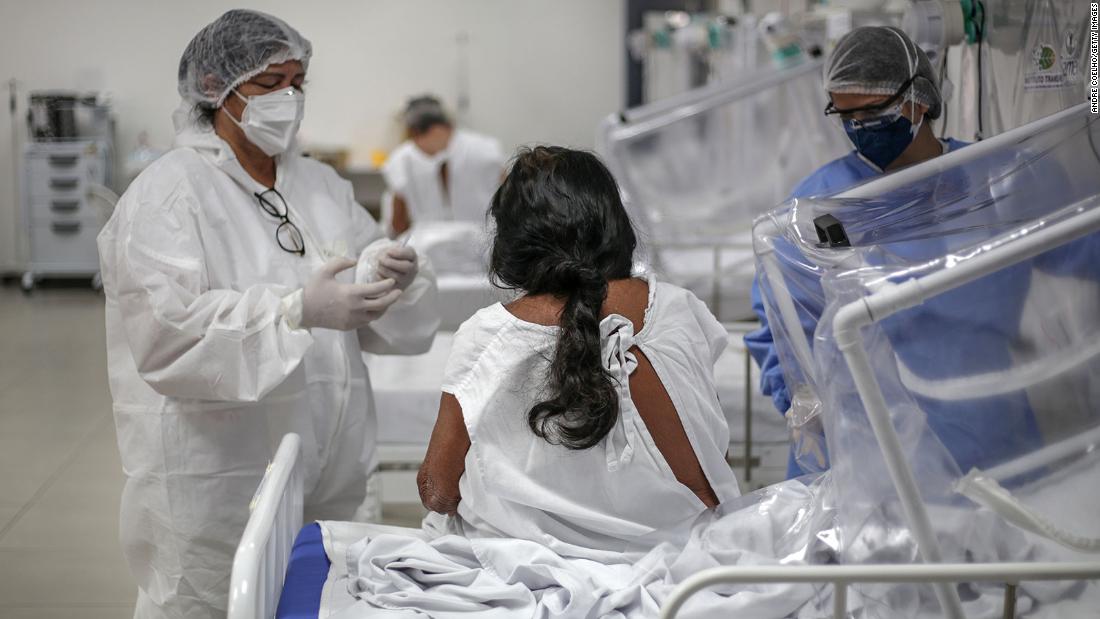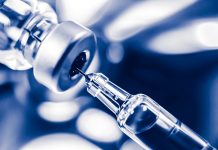Brazil, where the number of cases has now surpassed 2 million, is one of a small handful of sites for testing experimental coronavirus vaccines. It offers an unusual and appealing mix for research: a skyrocketing rate of transmission, as well as internationally respected research centers and a public health system experienced in creating and distributing vaccines.
According to the World Health Organization, as of July 14, 163 Covid-19 vaccines were being developed around the world, and 23 of them had started clinical trials involving humans. But only two have reached Phase 3 — the last scientific stage before approval to be marketed — which requires large-scale trials with thousands of individuals to assess the efficacy and safety of the vaccine.
Both Phase 3 trials will include Brazil and are scheduled to involve at least 14,000 Brazilians. Advanced talks are also underway to launch three more vaccine trials in the country, according to Brazilian institutes consulted by CNN.
While Brazil’s president, Jair Bolsonaro, has repeatedly downplayed the virus as a “little flu” and been criticized by experts for his unwillingness to implement forceful nationwide containment measures, the vaccine research being carried out now inside Brazil’s borders could prove to be a global game changer as the northern hemisphere braces for a possible second wave in the winter.
Julio Barbosa, a 42-year-old nursing technician who has already lost five colleagues to the coronavirus, has volunteered to participate in one of the mass vaccination trials, conducted by Oxford University and pharmaceutical company AstraZeneca. The Phase 3 trial will involve 50,000 volunteers worldwide.
After taking the shot, Barbosa says he had a low-grade fever and mild muscular pain which disappeared the next morning. In the trial, involving mostly health workers, half of the volunteers are receiving the trial Covid-19 vaccine and half are receiving a meningitis vaccine, which can provoke similar symptoms.
“This vaccine has to come out soon so we can have a break at the hospital. I haven’t stopped working in the last four months,” he told CNN after receiving a shot at a medical warehouse erected in Sao Paulo for the trial.
Chinese biotech company Sinovac is also beginning a Phase 3 trial in Brazil, in collaboration with Brazil’s Butantan Institute in Sao Paulo. Its CoronaVac trial vaccine uses inactivated virus cells to stimulate an immune response in patients. The tests will begin next Monday with 9,000 volunteers in five Brazilian states plus the capital.
Like the Oxford vaccine, CoronaVac will be given mostly to health professionals. Ricardo Palacios, medical director of research at Butantan, says that the institute is also in “very advanced conversations with two other vaccines under development” and in talks with dozens of pharmaceutical companies about Covid-19 research studies.
“All producers in the world will always look for a place where there is high transmission to attest to the effectiveness of the vaccine. But infection rate is not enough. A country needs to have institutions that work with international scientific, regulatory, and ethical protocols to carry out the tests,” Palacios told CNN.
Brazil is just such a place, said Natalia Pasternak, researcher at the vaccine development laboratory of the Institute of Biomedical Sciences at Sao Paulo´s University (USP). She pointed out that Brazil has advanced logistics and manufacturing installations compared to many other countries with rampant Covid-19, such as Mexico.
“It is necessary to go to a country where the disease is circulating strongly and where there are institutes and qualified professionals to carry out the tests. Brazil offers these two crucial factors,” she said.
More than 76,000 people have died in Brazil from the coronavirus, and the Pan American Health Organization has warned that case numbers in this nation of 211 million people likely won’t peak until mid-August.
Preliminary results from the trials are expected to come out by the end of the year, and should help to shorten the time that vaccines in earlier stages of development will need to be developed.
Guaranteeing Brazilians access to future vaccines
The “number one goal” of Brazil’s health system is to have the freedom to produce a vaccine, Interim Health Minister Eduardo Pazuello told Congress last month. “We cannot be left out,” he said.
As part of the agreements to host trials, Brazil expects to be able to produce both vaccines at home if they prove effective, rather than buying them abroad — a crucial benefit for both the country and even its neighbors.
Butantan, which produced 100 million flu vaccines last year, is preparing to produce a similar number of doses for Sinovac’s CoronaVac, if that vaccine proves effective.
“To have a pre-existing structure already installed is necessary because Brazil will help to make other vaccine agreements. Latin America has few (vaccine) manufacturing plants. Brazil will need to export the vaccine to other countries after attending its public health system,” Palacios, Butantan’s medical director, said.
The Biomanguinhos complex in Rio de Janeiro, owned by the Oswaldo Cruz Foundation, is also preparing to produce 70 million doses of the Oxford vaccine next year, in the hopes that ongoing negotiations between the Brazilian government, Oxford and AstraZeneca will be completed by then.
Meanwhile, the results are yet to come in from the Brazilian government’s own experiments with mass distribution of hydroxychloroquine. Medical trials have not proven hydroxychloroquine effective as a coronavirus treatment. Nevertheless, Brazilian mayors, doctors, and medical insurance companies continue to distribute a “Covid kit” — comprised of hydroxychloroquine, the antibiotic azithromycin, anti-parasitic drug ivermectin, zinc, and vitamin C — in cities in the South, Center-West, and Northeast regions of the country. With the exception of conflicting results on hydroxychloroquine, none of these treatments has been shown to help coronavirus, either alone or in combination.
Last week, after his own diagnosis with Covid-19, Bolsonaro released a video in which he praised the unproven drug, swallowing a tablet with a smile on camera. “It is working for one more person. I trust hydroxychloroquine. What about you?” the president said.
More trials and more data in the future
Soon, more Brazilians may soon be recruited as test subjects for other potential coronavirus-related treatments.
The Federal University of São Paulo (Unifesp), responsible for carrying out the Oxford vaccine trial that started on June 20 in Brazil, says it will soon announce a joint trial with Italy’s Lazzaro Spallanzani National Institute, which participated in the development of the European vaccine against Ebola virus.
The Italian institute is currently finishing Phase I testing of its vaccine against Covid-19. As the infection curve declined in Italy, it began looking at hard-hit Brazil as a location for Phase II and III trials, according to Unifesp’s dean Soraya Smaili.
“We hope to start it at the end of August. We will see where the infections will be more prominent in the country to make the selection of volunteers, because infections appear to be slowing in Rio de Janeiro and Sao Paulo,” Smaili said.
For Barbosa, the nursing technician, developing any successful vaccine in Brazil would feel like a personal victory. “I’ve been dreaming about this. The first thing I would do is go to a samba and hug my friends. I would even lick the beer that drips on the counter,” he said.












